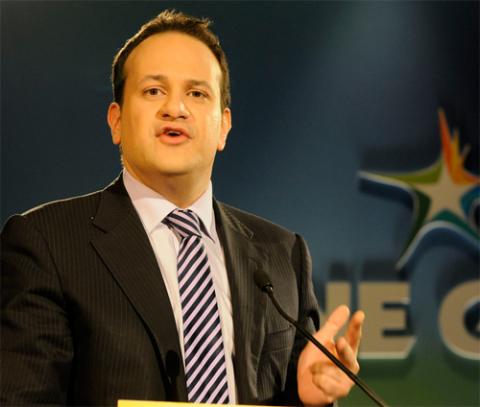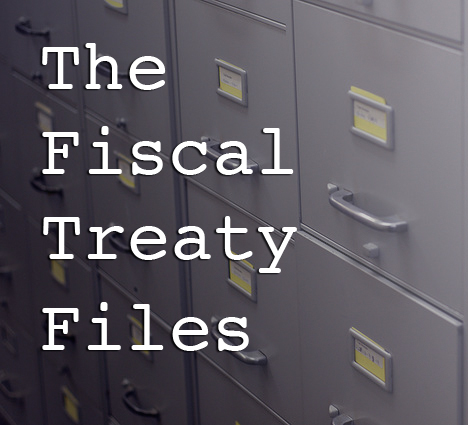Fiscal treaty will bring out the Government's inventive side

Members of Government are resorting to invention to justify their capitulation to ECB blackmail. By Vincent Browne.
On Sunday evening Minister for Transport Leo Varadkar, on RTÉ’s The Week in Politics programme, was asked why the State was paying unguaranteed Anglo bondholders and in particular the €1.2 billion it is paying today. He said the Government had to weigh up the advantages and disadvantages of doing this and the advantages were almost non-existent, for the €1.2 billion was not money we could retrieve in the short term, whereas the disadvantages were considerable.
Among the disadvantages he cited was that, as a consequence of defaulting on the bond payments, interest rates for semi-State firms here would increase, leading to higher electricity and gas charges for households.
Explaining this, he said: “We can look at Denmark. Denmark put one of the banks into resolution [ie default] last year and as a result of this the cost of borrowing for the Danish state and for Danish semi-states increased.”
I sent an email to the central bank of Denmark on Monday asking: “Whether interest rates for borrowing by state companies in Denmark has been affected by the decision to discount some bank debt in the recent past and if the sovereign borrowing rates have been affected.”
Within two hours I received the following reply: “The short answer to your question is ‘no’. There has been healthy demand for Danish bonds and we have not detected any negative spillover effects. Yours sincerely, Karsten Biltoft, Director, Administration, Danmarks Nationalbank, Havnegade 5. DK-1093, Copenhagen K, Denmark.”
I contacted Leo Varadkar’s press secretary and told him of the above. Shortly afterwards Leo Varadkar sent me a text message saying: “Nakheel, big public property company in Dubai, would have been a better example than small private bank in Denmark, but point still stands.”
I forwarded the exchange of emails to the press secretary and conveyed a query to his Minister: “On what basis did you claim on The Week in Politics programme that when Denmark discounted monies owed to bank bondholders the interest rates for loans to Danish state agencies and to the sovereign in Denmark was affected negatively? I note your text message that Nakheel, a big public property company in Dubai would have been a better example than a small private bank in Denmark and your contention that ‘the point still stands’, My question is does the point you made stand at all?”
Yesterday afternoon there was a follow-through from Leo Varadkar referring to an article by Dan O’Brien, economics editor of the Irish Times.
Incidentally, Leo Varadkar’s further claim that the troika told the Government that if Ireland defaulted on the bonds a financial “bomb” would go off was far-fetched too, even though he had made it clear he was extrapolating from what others had told him the Troika had said. (“What the ECB has said to us, and what the Troika has said to us is: ‘It’s on your head. We don’t want you to default on these payments, it is your decision ultimately. But a bomb will go off, a bomb will go off in Dublin, not in Frankfurt’.”)
Leo Varadkar is not usually a spoofer, unlike many of his ministerial colleagues. He often gets things wrong and, invariably, acknowledges when this happens, which is unusual. In the instance of the Danish interest rates, I think he was chancing his arm.
But the interesting point is that members of this Government have to resort to invention to justify their capitulation to ECB blackmail on Ireland carrying a huge burden of European banks’ distress. And we can expect a great deal more of this in the coming months on the fiscal treaty. For instance, we have already heard from Minister for Finance Michael Noonan that a referendum on the treaty would be on whether we were to remain in the euro zone or not. Which is entirely false.
There is a clause in the most recent draft of this fiscal treaty that has the imprint of this Irish Government on it, for it is intended to intimidate electorates into voting for the treaty – Ireland being the only country where a referendum might happen. The clause is among the initial recitals and reads:
“STRESSING the importance of the Treaty establishing the European Stability Mechanism as an element of a global strategy to strengthen the Economic and Monetary Union and POINTING OUT that the granting of assistance in the framework of new programmes under the European Stability Mechanism will be conditional, as of March 1st, 2013, on the ratification of this Treaty by the Contracting Party concerned and, as soon as the transposition period mentioned in Article 3(2) has expired, on compliance with the requirements of this Article.”
This is legal nonsense. There is no such requirement in the treaty establishing the European Stability Mechanism, nor could there have been for, when that latter treaty was signed, this fiscal treaty was not envisaged. So how did this get into the draft of the fiscal treaty, other than as a device to intimidate the Irish electorate should a referendum occur? The fiscal treaty has no power to make any EU funding conditional on anything, but you can be sure we will be bombarded with this if there is a referendum.
There is much else about this treaty that is legally suspect and much else that is invidious. {jathumbnailoff}
 This article is part of our Fiscal Treaty Files series. For more of our coverage of the Fiscal Treaty click here.
This article is part of our Fiscal Treaty Files series. For more of our coverage of the Fiscal Treaty click here.
